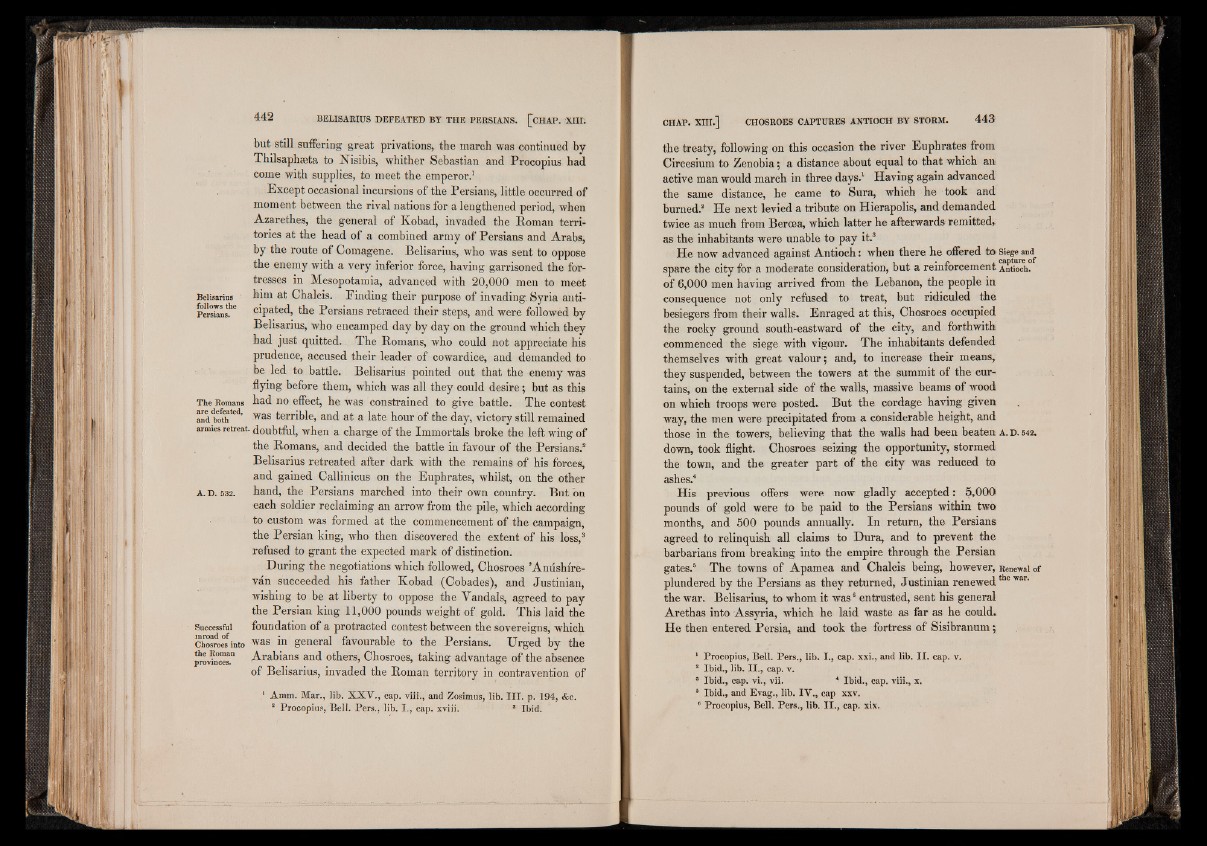
Belisarius
follows the
Persians.
The Homans
are defeated,
and both
armies retreat
A. D. 532.
Successful
inroad of
Chosroes into
the Roman
provinces.
but still suffering great privations, the march was continued by
Thilsapheeta to Nisibis, whither Sebastian and Procopius had
come with supplies, to meet the emperor.1
Except occasional incursions of the Persians, little occurred of
moment between the rival nations for a lengthened period, when
Azarethes, the general of Kobad, invaded the Roman territories
at the head of a combined army of Persians and Arabs,
by the route of Comagene. Belisarius, who was sent to oppose
the enemy with a very inferior force, having garrisoned the fortresses
in Mesopotamia, advanced with 20,000 men to meet
him at Chalcis. Finding their purpose of invading. Syria anticipated,
the Persians retraced their steps, and were followed by
Belisarius, who encamped day by day on the ground which they
had just quitted. The Romans, who could not appreciate his
prudence, accused their leader of cowardice, and demanded to
be led to battle. Belisarius pointed out that the enemy was
flying before them, which was all they could desire; but as this
had no effect, he was constrained to give battle. The contest
was terrible, and at a late hour of the day, victory still remained
doubtful, when a charge of the Immortals broke the left wing of
the Bomans, and decided the battle in favour of the Persians.2
Belisarius retreated after dark with the remains of his forces,
and gained Callinicus on the Euphrates, whilst, on the other
hand, the Persians marched into their own country. But "on
each soldier reclaiming an arrow from the pile, which according
to custom was formed at the commencement of the campaign,
the Persian king, who then discovered the extent of his loss,3
refused to grant the expected mark of distinction.
During the negotiations which followed, Chosroes ’Anushire-
van succeeded his father Kobad (Cobades), and Justinian,
wishing to be at liberty to oppose the Vandals, agreed to pay
the Persian king 11,000 pounds weight of gold. This laid the
foundation of a protracted contest between the sovereigns, which
was in general favourable to the Persians. Urged by the
Arabians and others, Chosroes, taking advantage of the absence
of Belisarius, invaded the Roman territory in contravention of
1 Amm. Mar., lib. X X V ., cap. viii., and Zosimus, lib. I I I . p. 194, &c.
2 Procopius, Bell. Pers., lib. I ., cap. xviii. * Ibid.
the treaty, following on this occasion the river Euphrates from
Circesium to Zenobia; a distance about equal to that which an
active man would march in three days.1 Having again advanced
the same distance, he came to Sura, which he took and
burned.2 He next levied a tribute on Hierapolis, and demanded
twice as much from Berosa, which latter he afterwards remitted*
as the inhabitants were unable to pay it.3
He now advanced against Antioch: when there he offered to siege and
spare the city for a moderate consideration, but a reinforcement Antioch,
of 6,000 men having arrived from the Lebanon, the people in
consequence not only refused to treat, but ridiculed the
besiegers from their walls. Enraged at this, Chosroes occupied
the rocky ground south-eastward of the city, and forthwith
commenced the siege with vigour. The inhabitants defended
themselves with great valour; and, to increase their means,
they suspended, between the towers at the summit of the curtains,
on the external side of the walls, massive beams of wood
on which troops were posted. But the cordage having given
way, the men were precipitated from a considerable height, and
those in the towers, believing that the walls had been beaten a . d . 542.
down, took flight. Chosroes seizing the opportunity, stormed
the town, and the greater part of the city was reduced to
ashes.4
His previous offers were now gladly accepted: 5,000
pounds of gold were to be paid to the Persians within two
months, and 500 pounds annually. In return, the Persians
agreed to relinquish all claims to Dura, and to prevent the
barbarians from breaking into the empire through the Persian
gates.5 The towns of Apamea and Chalcis being, however, Renewal of
plundered by the Persians as they returned, Justinian renewed *e war'
the war. Belisarius, to whom it was6 entrusted, sent his general
Arethas into Assyria, which he laid waste as far as he could.
He then entered Persia, and took the fortress of Sisibranum;
1 Procopius, Bell. Pers., lib. I., cap. xxi., and lib. I I . cap. v.
8 Ibid., lib. I I ., cap. v.
3 Ibid., cap. vi., vii. * Ibid., cap. viii., x.
5 Ibid., and Evag., lib. IV ., cap xxv.
6 Procopius, Bell. Pers., lib. I I . , cap. xix.